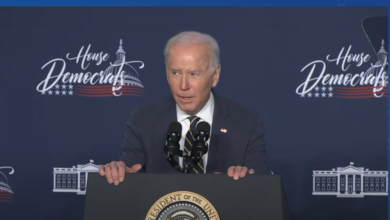The GOP Budget: Hope for a Fiscally Conservative Future
The federal government has few constitutional powers and responsibilities. One of those responsibilities that made the Founding Father’s very short list is that Congress shall pass a budget every year. Given how much time our elected officials spend on Capitol Hill, you would think that this responsibility would not be overwhelming.
Apparently, it is. As Conservative Daily News reported last week, it has been over a thousand days since the U.S. Senate passed a budget, and it looks like they will derelict on their constitutional duty this year again.
By refusing to live up to its constitutional responsibility, the Senate leadership has effectively handed the budgeting authority over from the legislative branch to the executive branch. Given that the federal government controls more than one fifth of our economy (including cash entitlement programs like Social Security) this is a serious matter. It is an unconstitutional transfer of power from one branch of government to the other in direct violation of the checks-and-balances principle.
The Senate’s budgetary AWOL strategy is aggravated by the fact that the federal government effectively controls the budgets of almost every state, and indirectly a big part our local government budgets. The fiscal powers thus concentrated (but not vested) in the hands of the president thereby extend to another 15 percent of the economy.
One of the consequences of this breakdown of checks and balances in the budget process is that the executive branch effectively can spend as much as it wants on credit. Congress has not yet punted on its right to tax the American people, and the balance between the Republican-led House and the Democrat-controlled Senate has prevented taxes from going up. But since the White House now de facto has full control over the budget they can choose to spend as much as they want. All they have to do is borrow what they don’t get from taxes.
In short: by refusing to let the Senate pass a budget, the senatorial leadership actively contributes to the nation’s already very serious debt problems.
But there is hope. In the midst of the complete irresponsibility exhibited by Senate Democrats and the apparent desire by President Obama to spend as much as he can get his hands on, House Republicans have actually produced a pretty decent budget for the 2013 fiscal year.
In fact, the new GOP budget is probably the most compelling fiscal-policy documents produced by Republicans in Congress since the 1990s welfare reform. Its main architect, Representative Paul Ryan (R-WI), deserves credit and respect for a bill that actually tackles the very driving forces of excessive government spending.
What really gives us hope for the future is the fact that Senator Rand Paul (R-KY) has a budget bill that suggests reforms that in many ways mimic what is in the House budget bill. If both chambers of Congress actually get a fiscally conservative majority after the election in November, things could take a turn for the better very soon in 2013.
One of the most important features of the GOP House budget is that it draws an ideological line in the sand. It wants to break away from the Obama administration’s ambitions to continue America’s march into a European-style welfare state and instead restore the American tradition of limited government.
Conservative cynics will say that Paul Ryan’s efforts are too little, too slow. That is a valid point. However, the main hurdle in the way of returning to limited government is the welfare state. The welfare state is the key cost problem of the federal government. It took liberals decades to build it, and it won’t go away overnight. The GOP budget takes two first steps, though.
The first is, again, a recognition that there are two distinctly different ambitions for the role of government in America:
The first responsibility of the federal government is the safety and security of all Americans. … This overarching governmental responsibility – securing the inherent rights of all Americans to life, liberty and the pursuit of happiness – is the principle and the purpose that informs this entire federal budget.
The budget then outlines the difference between a redistributive, Scandinavian-style welfare state and a no-fault government safety net. In the Scandinavian model, government takes from one group of citizens and gives to another on a permanent basis, regardless of whether the entitlement recipients can provide for themselves or not.
A no-fault model, by contrast, limits government to providing a safety net for the poor and needy. Two rules determine when benefits kick in:
- It is established that it is fault of your own that you are suffering financial hardship, and
- All private options for support and help have been exhausted.
One particularly important point in the GOP budget is expressed on page 37:
[Some] aspects of the [current] safety net impose barriers of their own. For instance, the elimination of certain benefits as income rises has the effect of imposing a tax that discourages some low-income Americans from seeking lives of independence and self-sufficiency. … In particular, it is essential to prevent benefits structures from becoming barriers to upward mobility.
This is precisely what the redistributive, Scandinavian-style welfare state does: it traps the poor in poverty and turns them into perennial welfare consumers.
What makes the GOP budget so compelling is that it also makes an honest effort to turn this good analysis into actionable policy. It echoes some ideas from 1990s welfare reform by emphasizing job training as a way out of life long welfare dependency (p. 41):
If government is to require able-bodied recipients of aid to find work, as it should, then it must also help them return to productive working lives. To that end, federal education and job-training programs need to be modernized to keep the workforce competitive in a 21st century, global economy. Government must do a better job of targeting resources to make sure that America’s workforce can successfully pursue new opportunities and adopt new skills, if necessary.
It also wants to introduce block grants for federally sponsored, state-run welfare programs. There is also a spelled-out ambition to reform Medicare and to keep federal spending within 20 percent of GDP.
Taken together, these proposed policy reforms obviously will not eliminate big government in a hurry. But, again, if you are driving toward the edge of a cliff, it is better to at least stop and turn the car around than to continue straight ahead.
Our current policies are taking us straight into the dungeon that has swallowed Greece, Spain and other European fiscal disasters. The GOP budget shows that we are within reach of evading that dungeon. A fiscally conservative majority in Congress working with a president willing to listen to them could actually get some true spending reform done.
And make sure that America’s future once again is brighter than her past.




